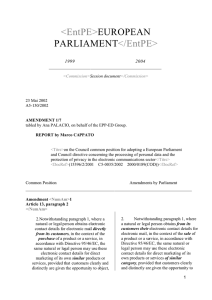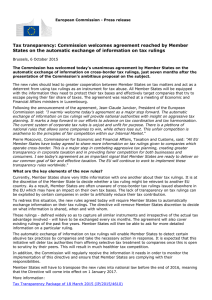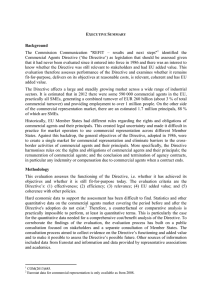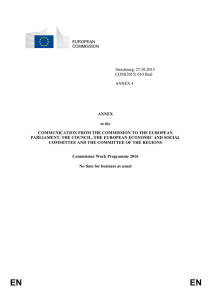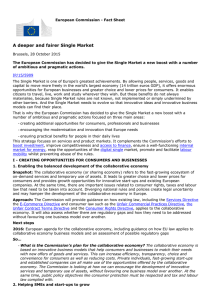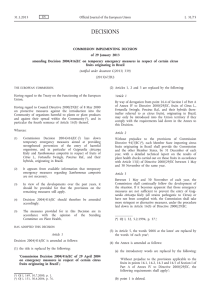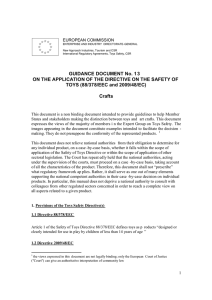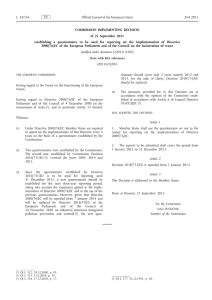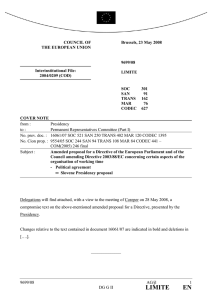The judgments of the European Court of Justice in the Viking
Anuncio
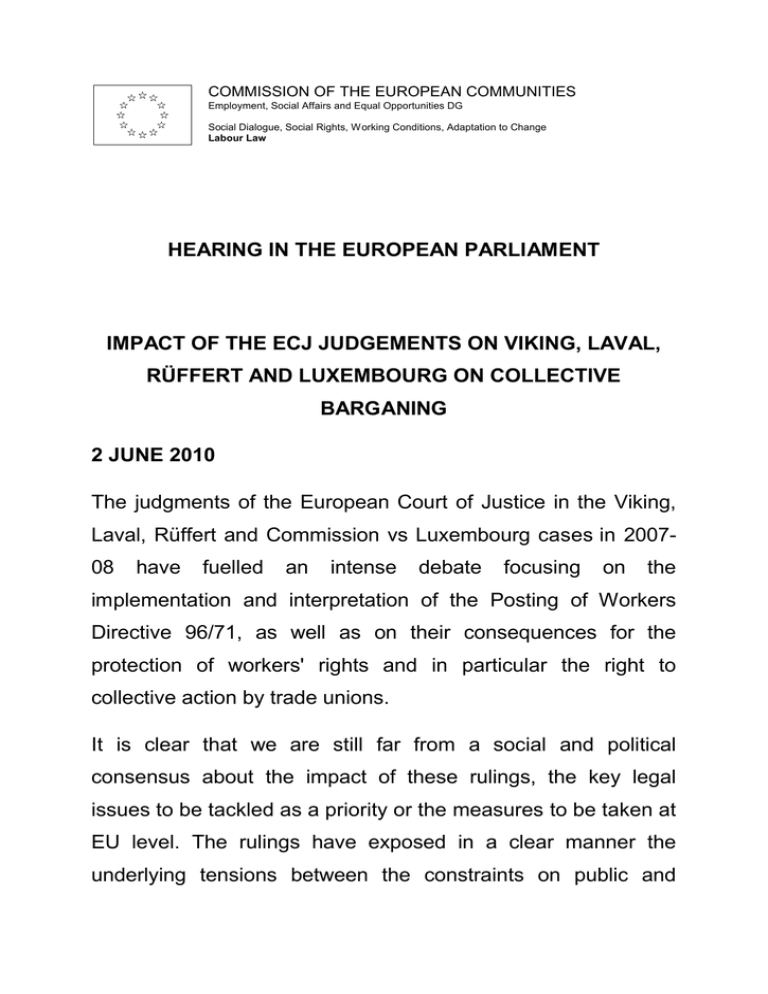
COMMISSION OF THE EUROPEAN COMMUNITIES Employment, Social Affairs and Equal Opportunities DG Social Dialogue, Social Rights, Working Conditions, Adaptation to Change Labour Law HEARING IN THE EUROPEAN PARLIAMENT IMPACT OF THE ECJ JUDGEMENTS ON VIKING, LAVAL, RÜFFERT AND LUXEMBOURG ON COLLECTIVE BARGANING 2 JUNE 2010 The judgments of the European Court of Justice in the Viking, Laval, Rüffert and Commission vs Luxembourg cases in 200708 have fuelled an intense debate focusing on the implementation and interpretation of the Posting of Workers Directive 96/71, as well as on their consequences for the protection of workers' rights and in particular the right to collective action by trade unions. It is clear that we are still far from a social and political consensus about the impact of these rulings, the key legal issues to be tackled as a priority or the measures to be taken at EU level. The rulings have exposed in a clear manner the underlying tensions between the constraints on public and private actors required by the full operation of the single market and their perceived distributive effects. And they have called for action by policy-makers to clarify the application of rules and to solve outstanding legal problems. We have to recognize that national governments directly or indirectly affected by the rulings already responded to this call. One of the most important effects of the rulings has been the resulting amendments of legislation in Denmark, Sweden, the German Land of Lower Saxony and Luxembourg. In Denmark and Sweden, the focus was on improving the compatibility between collective bargaining as practiced under national industrial relations and the definitions laid out in the posting directive. Also the conditions under which trade unions can take industrial action against a company using posted work were more clearly defined. Lower Saxony has removed the obligation for tenderers to commit to the remuneration specified by local collective agreements that have not been declared generally applicable. In Luxembourg, foreign undertakings were exempted from a number of requirements that could not be justified on the basis of public policy provisions, some of which are to be verified by the authorities in the country of origin of the posted worker. However, it is clear that the consequences of the rulings go well beyond those Member States whose laws were the subject of the Court rulings. As we see it, there are two key issues of general EU interest raised by the Court rulings (in particular Viking and Laval): To what extent can trade unions turn to industrial action in order to protect workers' interests without undermining economic freedoms like the right of establishment or of service provision in another Member state? This issue concerns the balance between economic freedoms and social rights safeguarded by the Treaty or by common principles of law. Have Member States or the national social partners the right to determine more favourable conditions for the workers that are posted temporarily in their territory, on top of the minimum conditions laid out in the Directive 1996/71, without creating obstacles to cross border provision? This issue concerns the interpretation of the provisions of Directive 1996/71, in particular Article 3. On the protection of workers' rights and trade unions’ right to take collective action, we believe the Court’s judgments neither call the principle, nor the substance of worker's rights into question. The Court has recognised for the first time that the right to take collective action is a fundamental right. It has also confirmed that trade unions will continue to be able to take action to protect workers, provided this is done in line with existing Community law. It should also be underlined that the free movement of workers, which sets out the right to work in another Member State, the freedom of establishment and the freedom to provide services, are fundamental principles of the European Union. These principles are translated i n t o Community law to guarantee a level playing-field for people and businesses. The aim is to maximise every opportunity for innovation and growth, while protecting the rights of mobile workers whether they move on their own initiative or are sent abroad by their employer. However, this should not mean that worker mobility or economic freedoms must be safeguarded when they are used deliberately to downgrade working conditions. Or to disregard the unions' role in defending the genuine interests of the workers they represent even in the case of cross-border disputes. In recognition of the importance of these issues from an European perspective, President Barroso committed himself before Parliament in September 2009 to proposing legislation, preferably a regulation, subject to the co-decision procedure, to resolve the problems of implementation and interpretation with a view to improving the application and enforcement of the Posting of Workers Directive. At the Conference on Posting of Workers and Labour Rights organised by the Spanish Presidency in Oviedo on 17/18th March 2010 Commissioner Andor announced his intention to translate the commitment made by President Barroso into a proposal, which he intends to submit in 2011 — after taking into account the findings of a consultation of all the stakeholders, including the European social partners. An important development in this connection has been the recent publication of the Monti Report "A New Strategy for the Single Market". The report addresses directly the issue of how the market and social dimensions of an integrated European economy can be mutually strengthened. In particular, it recognizes that, in order to make the relaunch of the Single Market sustainable it is necessary to address some critical frictions that have arisen in the social area and adjust single market rules to take account of the need of social and local contexts. As regards the situation created by the Court rulings, the report recommends "to clarify the implementation of Directive 96/71 and strengthen dissemination of information on the rights and obligations of workers and companies, administrative cooperation and sanctions in the framework of free movement of persons and cross-border provision of services". Moreover, the report recommends introducing a provision to guarantee the right to strike modelled on Art.2 of Council Regulation (EC) 2679/98 as well as a mechanism for the informal solutions of labour disputes concerning the application of the directive". It is useful to remind that the purpose of this Regulation was to renew the commitment to the free movement of goods while excluding any negative impact on the exercise of the right to strike. It sets out a prohibition of actions that "cause grave disruption to the proper functioning of the internal market and inflict serious losses on the individuals affected" whilst recognising that the right to strike is unaffected by that prohibition. A system of early warning about obstacles to free movement of goods and exchange of information between the concerned Member States is set up to build mutual confidence. The Commission plays an arbitration role, as it can request the Member State concerned to remove the identified obstacles to free movement of goods by a given deadline. The Commission is now examining the recommendations of the Report and will set out its blueprint for the relaunch of the Single market later in the year. It makes sense to analyse the options for the review of the legal framework of the posting of workers in the wider context of the relaunch of the Single Market. Several options are still being examined by the Commission as to scope, legal basis and instrument considering the implications of the Lisbon Treaty, including the Charter of Fundamental Rights. As to the identification of the scope of the review, this is a matter where there still is a wide divergence of views. In presenting its future proposals the Commission must have in mind the limits imposed by the Treaty to the EU legislative competences in particular by Article 153 (5) as regards the right to strike. The Commission should also avoid making proposals that will not help in forging a consensus between social partners or co-legislators. We should remind ourselves that, when it was adopted by the Council in 1996, the Posting of Workers Directive played a key role in clarifying the legal situation of posted workers which until then had been a controversial subject of successive Court rulings. The Directive did this by developing the concept of core mandatory employment conditions that the host country must impose on foreign companies. This was a smart compromise between the need to facilitate the cross-border provision of services and the protection of employment conditions for posted workers, while avoiding social dumping. We have reasons to believe that this compromise is still valid today. It continues to strike the right balance between worker protection and economic freedoms, including worker mobility. For this reason we are not convinced of the need for a complete overhaul of the Directive as it stands. But that does not mean that we should not look for solutions to improve aspects where we feel the implementation of the Directive has been less satisfactory — such as administrative cooperation, information of workers and companies, legal remedies and protection against abuses. Certain aspects deserve a closer attention. This is the case with the so-called letterbox companies that have no real economic activity in the country of origin and operate as a means to evade the labour and social security rules of the host country. The problem is not new for EU legislation or jurisprudence. According to the case law of the Court, Community law cannot be relied upon for abusive or fraudulent ends. However, it is not always easy to prove the abusive intention of using a freedom to choose the place of establishment with the only aim of lowering the level of wages and working conditions or to evade taxation. To clarify issues, the Services Directive has recognized in Recital 37 that a mere letter box does not constitute an establishment and states that the concept of establishment involves the actual pursuit of an economic activity through a fixed establishment for an indefinite period. Regulation 883/04 on the coordination of social security schemes, that has just entered in force, also requires as a condition for the affiliation of the posted worker to the social security system of the country of origin that the undertaking normally carries on its activities in the Member State in which it is established. Abuses can also occur in the case of subcontracting chains where it is not always clear who bears responsibility for fulfilling the conditions laid out in individual workers’ contracts. The Commission has been closely following the legal developments in Member States. There is a variety of liability regulations in place supported by sanctions, as well as preventive tools. Overall, it seems that such rules are effective in achieving their objectives when the subcontracting chain is purely national, but serious enforcement problems arise with respect to crossborder subcontracting. This justifies a special attention by the Commission on crossborder aspects of liability rules which will be the focus of a new EU wide study to be launched this year. It should be underlined that Directive 2009/52 on sanctions and measures against employers of illegally staying third-country nationals introduced for the first time liability rules in the framework of subcontracting. A mechanism of joint and several liability was created for financial sanctions and back payments relating to outstanding remuneration. Another issue is the extent to which normal supervision and control mechanisms in the host country apply to posted workers. The Directive guarantees that posted workers are fully covered by national controls of employment conditions to the extent that these are included in the core of mandatory employment conditions listed in the Directive, such as pay, working time or health and safety, i.e. all the conditions that are closely related to the place where work is actually delivered. The control of other employment conditions, more related to the employment contract, such as protection against dismissal, should be the remit of the authorities in the home country. Foreign providers need to respect rules set in national law that are included in the core mandatory employment conditions of article 3 of the Directive, as well as all public policy provisions in force in the host country. Declaration no. 10 of the Council does not depart on this point from accepted and constant case law of the Court. The Court has accepted (in Commission vs Luxembourg) that national legislation having a restrictive effect on the freedom to provide services may be justified where it meets overriding requirements relating to the public interest and is proportionate, necessary and is not safeguarded by the rules in force in the country of origin. Finally the option to take about the form of the future legislative initiative depends on the problems that this is intended to solve. From the viewpoint of Smart Regulation, Regulations should in principle be more widely used than Directives as they guarantee a more clear identification of obligations for all concerned. However, the Treaty only allows Regulations with an impact on working conditions when based on Article 352 (ex article 308) which requires unanimity in Council and consent by Parliament. Depending on the scope of the revision, it should be possible also to consider the possibility of an enforcement Directive. The Commission has started preparatory work with a view to such a legislative initiative, whatever its legal base or form, including several evaluation studies, conferences and projects. o An ex post evaluation of the impact of the Directive, covering its social, economic and legal aspects has been launched in 2009 and the first results are expected during the last quarter of 2010. This evaluation has been carried out with the support of the pilot project proposed by the EP in 2008. o An expert committee has been set up in order to address difficulties in the interpretation of the Directive which continues its work with the aim of clarifying outstanding issues and building up consensus. Examples of the issues under discussion are the application of the concept of public policy provision, just mentioned, the coverage of minimum rates of pay and how they can be compared across countries. o In the context of this expert committee a working group has been set up with the mission of assessing the feasibility of an electronic exchange system that would facilitate contacts between national administrations; o A feasibility Study on establishing a European platform for cooperation between labour inspectorates, to prevent and fight undeclared work, was launched in 2009 and results are also expected during the last quarter of 2010. o The Commission has also supported five transnational projects under different call for proposals in 2009. These will allow those closely involved in posting workers to exchange concrete experiences and best practice related to posting. Similar calls for proposals will be continued in 2010, also on the basis of the pilot project initiated by the EP. I hope to have made clear that the need to introduce clarification and to respond to justifiable concerns and anxieties by stakeholders remains a top priority for the European Commission. I also hope, I have managed to reply to most of your questions to the extent allowed by the progress of internal reflection in the Commission. I remain of course open to clarify further points in the course of this hearing. Thank you for your attention.
